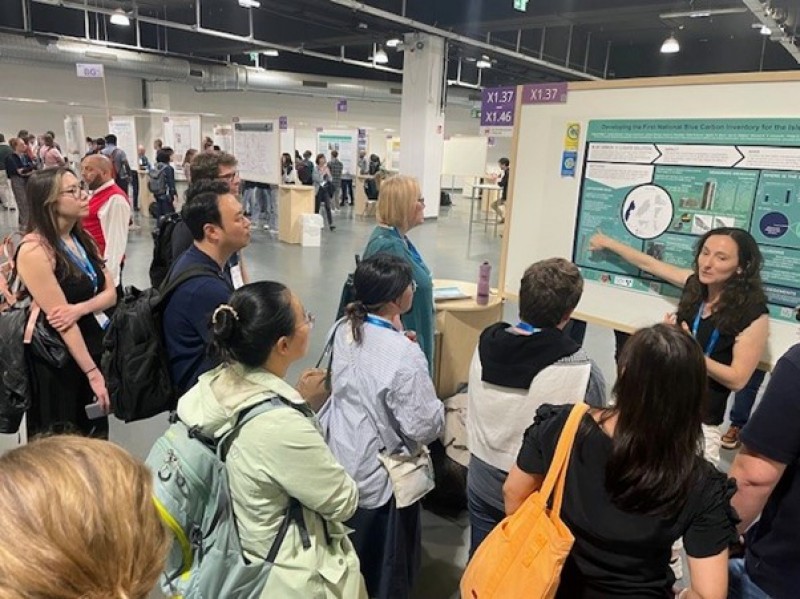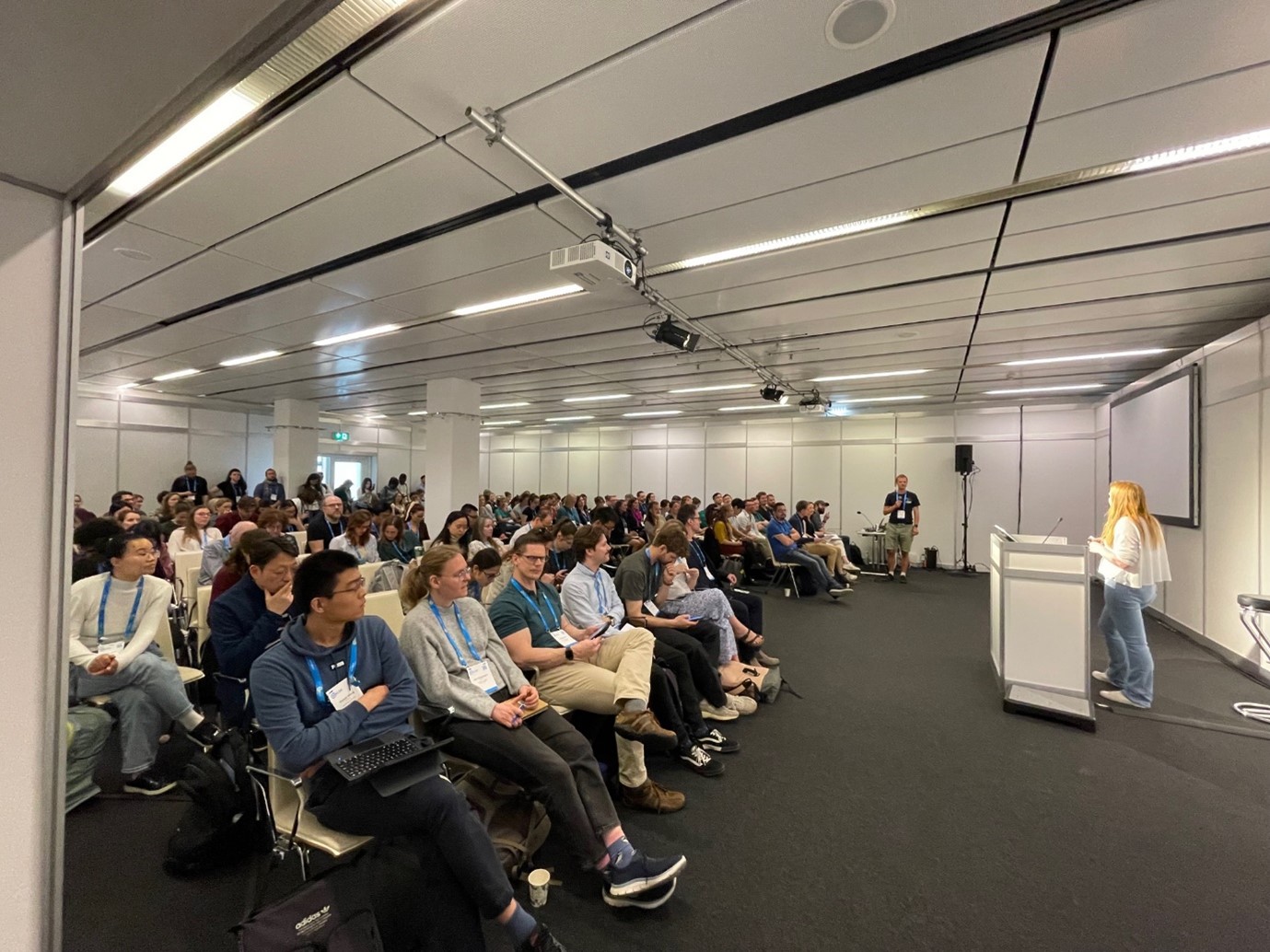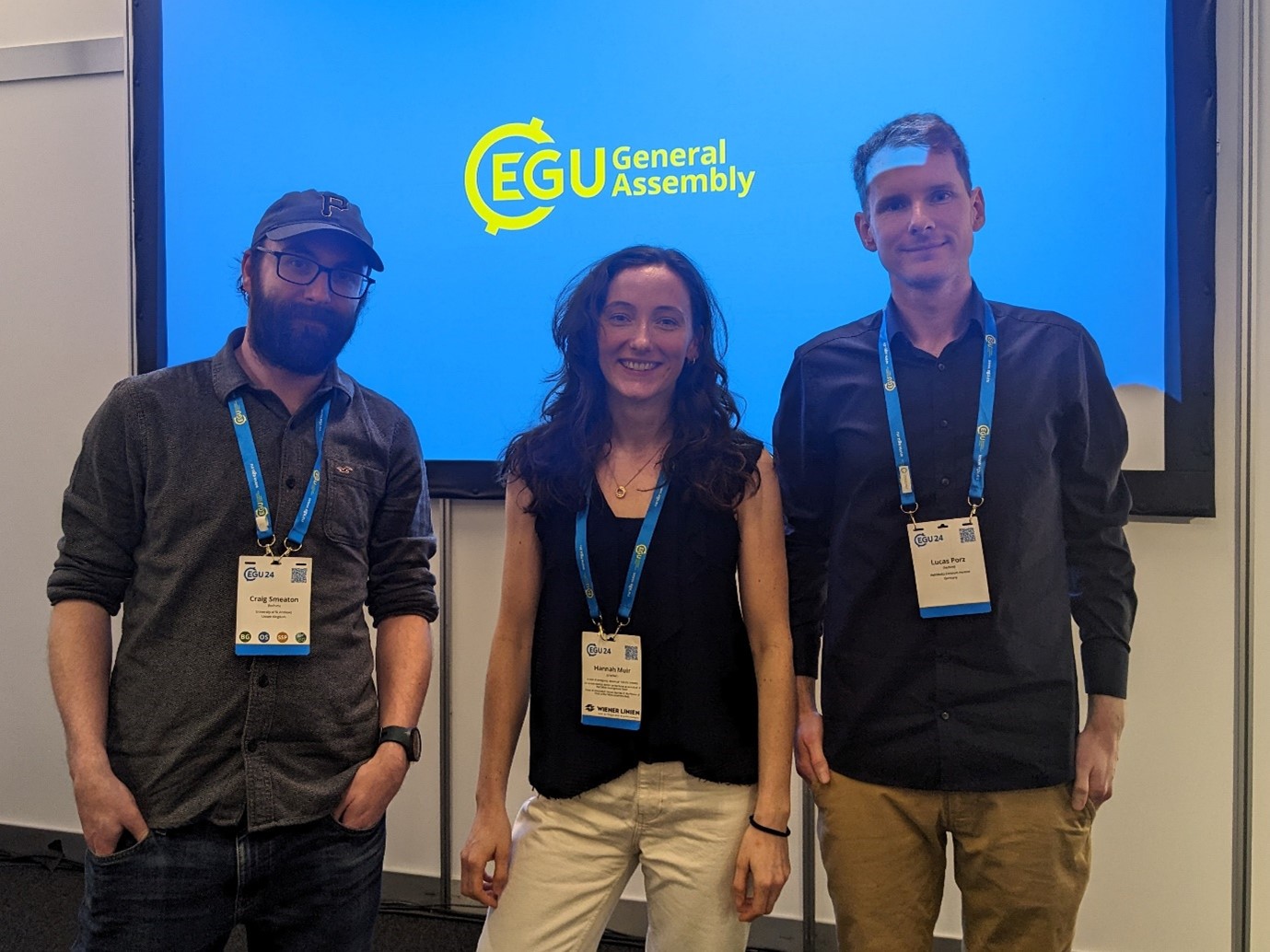Blue Carbon at the European Geosciences Union (EGU) General Assembly 2024
Hannah Muir
Swansea University and National Oceanography Centre Southampton

Caption: Presenting my research poster to an audience.
Attending the European Geosciences Union (EGU) General Assembly in Vienna this April was a fantastic opportunity during my PhD. With nearly 21,000 attendees from 116 countries, this conference provided a vast platform for knowledge exchange and networking, especially for early career scientists like myself. The conference's format, with multiple concurrent sessions, allows attendees to tailor their schedule to focus on sessions relevant to their research interests. Luckily for me, the abundance of sessions on "blue carbon" on the first day facilitated early networking with researchers in my field.
This year, I had the opportunity to present my research as a poster and co-convene a session on Blue Carbon – both new experiences that offered valuable learning opportunities. Chairing a session was a great opportunity to gain visibility among researchers in my field and to give back to the research community. From this platform I could introduce myself to researchers who I had been hoping to meet and was able to develop ties with new institutions across Europe.
 Caption: Our packed session on Blue Carbon on the first day of the EGU General Assembly 2024 (Photo credit: Dr Ed Garrett, University of York).
Caption: Our packed session on Blue Carbon on the first day of the EGU General Assembly 2024 (Photo credit: Dr Ed Garrett, University of York). Caption: Me (middle) with co-conveners, Dr. Craig Smeaton (left) and Dr. Lucas Porz (right), after our Blue Carbon session.
Caption: Me (middle) with co-conveners, Dr. Craig Smeaton (left) and Dr. Lucas Porz (right), after our Blue Carbon session.Presenting my research poster was highlight of my time in Vienna. Engaging in discussions with fellow researchers from around the world provided valuable insights on my PhD research, and a simple sticker highlighting my openness to postdoctoral positions in the coming year proved effective in sparking conversations. I received a few informal “come work for me!” comments, which I am looking forward to following up with in the coming months. The poster session for me highlighted just how valuable this format can be for establishing new connections with researchers at all levels that hopefully last beyond the conference.
Beyond my specific research area, I attended sessions covering a range of topics, from ocean alkalinity enhancement to nature-based solutions for urban environments, broadening my understanding of diverse geoscience disciplines and helping me to develop potential new avenues for my own research and interests. Specialised meetings and panel discussions hosted by leading researchers in my field also offered insights into the broader impact of my research area on policy and environmental initiatives, which is an area I’d like to continue to work in.
The conference offered opportunities for reconnecting with old colleagues and establishing new connections during coffee and lunch breaks, as well as during the infamous “beer o’clock”. I had the chance to meet up with a friend from my PhD who has since moved onto a post-doctoral position in Germany, and with a friend-of-friend who works in the implementation side of my research field in Switzerland. These informal networking opportunities are great for maintaining and establishing meaningful connections, as you never know where you’ll end up next. Incredibly, I also bumped into an old flat mate from my exchange year in Chicago many years ago, who is a post-doctoral researcher in the USA, proving that the EGU General Assembly is a melting pot of geoscientists the world over!
Another highlight of the EGU General Assembly this year was that, with the help of funding from the Challenger Society, I was able to choose a lower emission route to the conference. I took a combination of air and rail travel to the conference this year, balancing the cost and time implications with my budget. Whilst I would have loved to travel the entire route by rail, this was prohibitively expensive at the time of booking. I think cutting emissions where possible using hybrid travel options is a good compromise and, not only that, I was able to take the incredibly scenic rail journey from Zurich to Vienna – a must do!

Caption: Taking the scenic route to Vienna by train from Zurich.
I’m grateful for the Challenger Society for funding to attend the EGU General Assembly this year, as the conference not only enriched my scientific knowledge and developed my ability to present and defend my work (a vital skill leading up to the end of my PhD!), but it also reinforced my sense of community within the global geoscience field.
Author profile:
I’m a third year PhD student at Swansea University based at the National Oceanography Centre Southampton, where I study natural carbon storage in coastal and marine ecosystems around the Isle of Man. Prior to my PhD, I had quite a varied career path: from an integrated Masters degree in materials chemistry from the University of Edinburgh, to becoming a chemistry journals editor for Wiley in Germany, then a project manager for a website design company in Edinburgh, and finally to studying marine biogeochemistry in Orkney and now Southampton. I’ve always been fascinated with chemistry, geosciences, communicating science, and managing complex projects, so it was only a matter of time before a research career came calling. My main goal now is to centre natural ecosystems within decision making at the interface of science, policy, and society.
Latest News
Marine Data Management, Governance and the MEDIN toolset
The Marine Environmental Data and Information Network (MEDIN) and OceanWise are delighted to invite you to attend our popular free online training workshop: ‘Marine Data Management, Governance and the MEDIN toolset’ on the 19th – 23rd of May 2025.
Workshop on the contribution of UK Arctic Ocean science to the International Polar Year 32/33
12:00 11th June – 16:00 12th June 2025: NOC Southampton (In-person with online option): Registration deadline 16th May
REGISTER HERE
Pre-meeting questionnaire (open to all)
The purpose of this workshop is for the UK Ocean Science community to discuss and then draft a prospectus document outlining the priority Arctic research questions the community would like to address during the run up to, throughout and beyond the International Polar Year 32/33. Additionally, to identify what unique strengths and technologies the UK has to help fill these knowledge gaps.
The second day of the workshop will be dedicated to writing groups, one for each of the priority research questions identified - from both the pre-meeting questionnaire (HERE) and day one discussion. By the end of the meeting, each group will have produced draft text and sourced supporting figures for the prospectus.
Post meeting, the draft will be opened for comments and suggestions from everyone, regardless of whether they were able to attend the workshop or not. It will then be shared with UK funders (UKRI, FCDO, DSIT, ARIA) and potential international programmes with whom we would like to collaborate (e.g. Arctic 2050, Norway). It will form a basis from which wider integration with terrestrial, atmospheric and cryosphere communities can be built, e.g. at the UK Arctic Science Meeting in September in Northumbria.
To ensure balanced community and ECR representation, and to ensure that the size of the writing groups is efficient and effective, if the number of registrations from individual institutes becomes overwhelming, we may contact individuals or teams and ask that each institute selects a smaller number of individuals to attend in-person. Please wait for confirmation of in-person attendance before finalising travel arrangements.
The workshop will be open to hybrid attendance and contributions on both days.
Challenger Society Council Position Vacancy
The Challenger Society for Marine Science (CSMS) are pleased to announce an exciting opportunity to support the next generation of ocean scientists and innovators. CSMS are looking for a new Council member to fill the Student Travel Awards and Stepping Stones Portfolio. The successful applicant will administer the travel and research grants available for Early Career Researchers.
The role involves:
- Receiving applications for the two schemes and responding to applicant inquiries
- Soliciting and compiling input from the rest of the Council for assessing the applications
- Communicating with successful and unsuccessful applicants for the two schemes
- Working with the Honorary Treasurer on allocating funds to successful applicants
- Following up with award winners on their reporting requirements
- Attending Council meetings four times a year (in person or online) and contributing to discussions and decision making for CSMS
The usual term for Council members is three years.
For more information about the CSMS Council, please follow this link: https://www.challenger-society.org.uk/The_Council
For more information about our Early Career Researcher grants and awards, please follow this link:
https://www.challenger-society.org.uk/Stepping_Stones
and
https://www.challenger-society.org.uk/Travel_awards
If you are interested in applying or have any questions regarding the role, please contact kathen@bas.ac.uk
